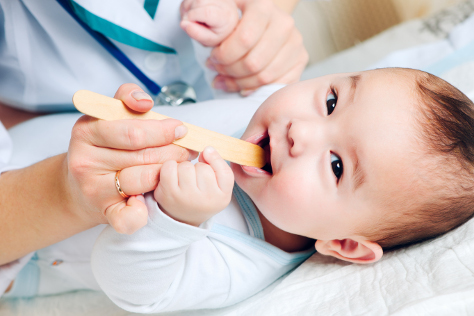What is Thrush in babies?
The same yeast fungus that can cause vaginal thrush, Candida Albicans, is also found in the mouth, and babies and children up to the age of two are particularly susceptible to oral Thrush
Thrush is most common in babies around a month old, and happens because young babies' immune systems aren't yet mature, so they're more susceptible to infection. They're also more at risk if they've had antibiotic treatment, as this lowers the amount of healthy bacteria in the mouth, allowing the yeast fungus to overgrow.

Most babies with oral Thrush seem untroubled by the condition, but some may be reluctant to feed if it's causing them any soreness.
Sometimes babies can pass oral thrush to their mums through breastfeeding. This can cause nipples to become sore and if left untreated, could make feeding painful.
What are the symptoms of Thrush in babies?
If your baby has oral Thrush, you'll notice one or more white or yellowish spots or patches inside your baby's mouth. This resembles cottage cheese and is easily rubbed off, although there will be sore-looking patches underneath.
Some babies can have oral Thrush without any visible symptoms, but you might notice your baby fusses during feeds, fails to gain enough weight or dribbles a creamy-coloured drool. Check with your GP or health visitor to get a diagnosis.
What are the treatments and remedies of Thrush in babies?
Most cases of Thrush in babies clear up on their own within a few days, but if your GP does prescribe anything for your baby it will probably be miconazole gel, which is an antifungal preparation. This is applied directly on to the patches inside your baby's mouth using a clean finger.
Nystatin liquid is sometimes prescribed if the miconazole gel doesn't clear the symptoms, or for babies less than four months old. Nystatin comes as drops that you apply to the patches.
This guide
The information in this Bounty A-Z of Family Health is not a substitute for an examination, diagnosis or treatment by a doctor, midwife, health visitor or any other qualified health professional. If in doubt, always speak to a doctor.
Bounty will not be held responsible or liable for any injury, loss, damage, or illness, however this occurs or appears, after using the information given on this website and in particular the A-Z of Family Health.
Further help
For health advice and information 24 hours a day, 365 days a year, the NHS offers call and web services. You can also visit NHS websites for services, health information and health news at nhs.uk
- England – call 111 from any landline or mobile phone free of charge, or visit nhs.uk
- Scotland – call 111 from any landline or mobile phone free of charge, or visit nhs24.com
- Wales – call 0845 4647 , or visit nhsdirect.wales.nhs.uk
- Northern Ireland – visit hscni.net